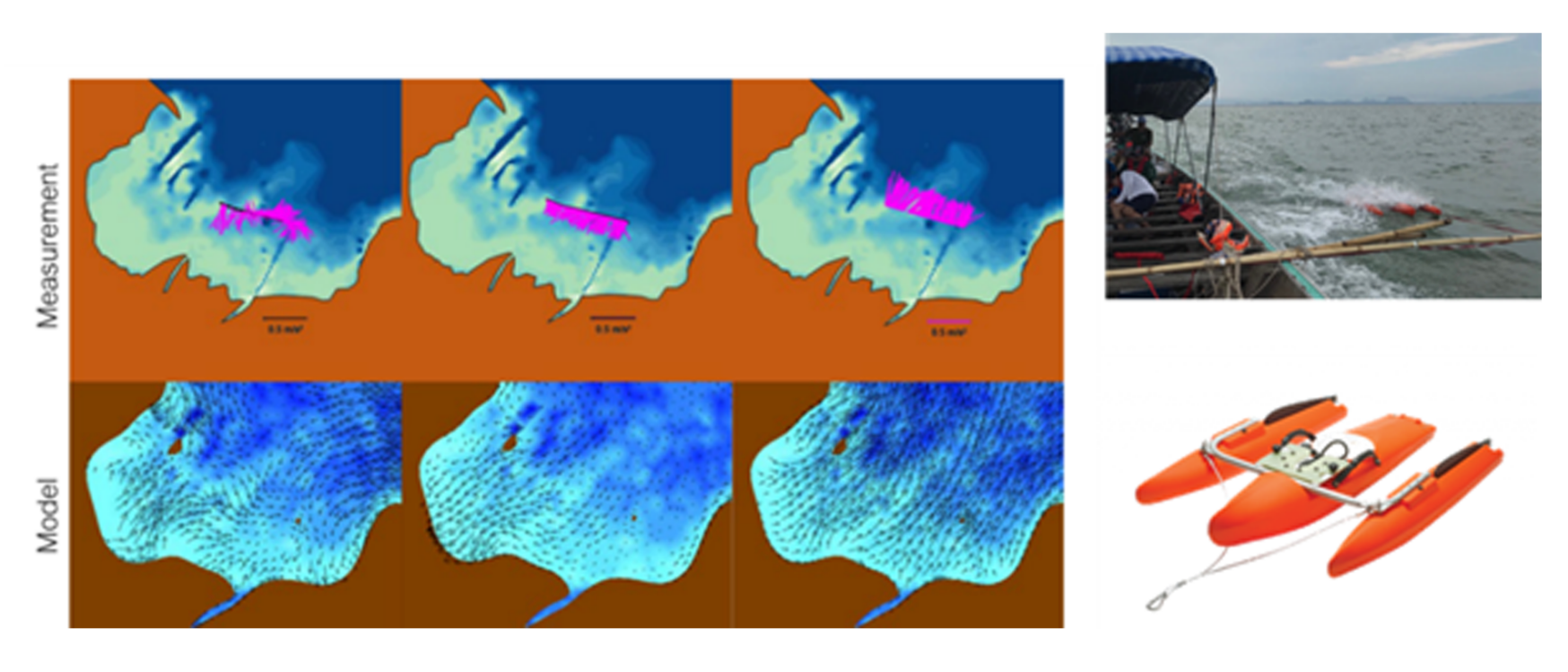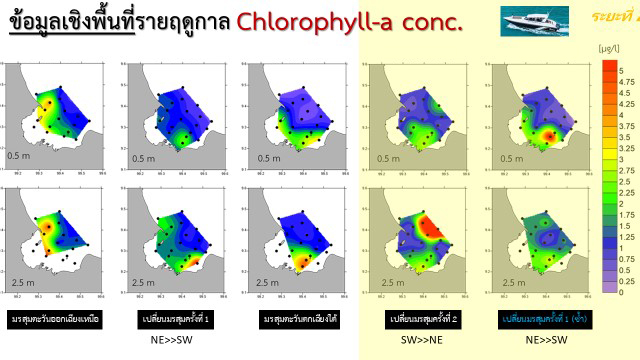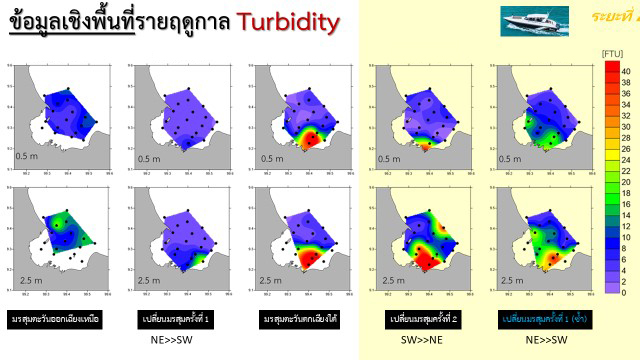Monitoring the Health of Aquatic Ecosystems
Walailak University is located near the essential marine ecosystem areas. The university has monitored the health of aquatic ecosystems in the nearby zones, including the Kra Island Ecosystem, Phuket coastal and offshore ecosystem, and Coastal and marine ecosystem in Nakhon Si Thammarat, where Walailak University is located. WU considered that the health of the aquatic ecosystem is important to monitor. Also, the health of the ecosystem should consist of biological, chemical, and physical monitoring. Appropriated technologies are used for monitoring processes. Several techniques and activities were done in 2024 as detailed below.
1. Monitoring the health of aquatic ecosystems of Bandon Bay by Using GIS and Remote Sensing.
Bandon Bay, a large watershed area, is located near Walailak University. From 2018 until 2022, 2023 and 2024. WU researcher received research scholarship from National research council of Thailand and ARDA to continue research work including both oceanography and ecosystems in Bandon Bay. A research team from Walailak University, government researchers, local authorities and TFFA (Marine product industry) conducted research together. The objectives of research were to monitor water and sediment quality, fishing gears practices, oceanography, and land use in both agriculture and industry in surrounding areas. Geographic Information System (GIS) and Remote Sensing were applied for data gathering, monitoring, analyzing, and predicting. The results taken from GIS and remote sensing are used for area illustrating or mapping. These technological tools are useful for monitoring Bandon Bay Ecosystem because environmental situation will be reported in type of sensitive area that make clearly understand environmental situation in each zone of Bandon Bay.





2. Monitoring the health of aquatic ecosystems of Phuket coral reef ecosystem by using CTD Sensor network
Coral reefs are critical to biological diversity. However, coral bleaching is presently occurring in numerous areas, and recovery is challenging. As Phuket province is close to Walailak University. WU researchers were assigned to use CTD sensor network to measure environmental conditions near coral ecosystems and conduct tsunami research on Racha Island in Phuket Province. Since 2020 until 2022 and in future, Walailak University has been organizing a coral sensor network project to monitor the changing temperature, conductivity, and depth of the sea by placing a CTD sensor (Conductivity, Temperature, and Depth sensors) at Khon Khae Bay and Patok Bay on Racha Island, Phuket Province. After five years of project beginning, in 2024, the researcher expands the study area and installs CTD sensor network in Khon Khae Bay and Patok Bay to monitor health of Coral ecosystem. Moreover, the collected data were then used for supporting management strategies for policy makers in order to maintain coral ecosystem complexity in Phuket province.
3. Monitoring the health and abundance of Crabs and fishes around Nakhon Si Thammarat province.
In 2024, Walailak University, in association with 85 coastal fishing communities covering 12 Districts in Nakhon Si Thammarat area, collected catch rate of fishermen in order to monitor health of ecosystem in terms of abundance and diversity. In addition, 85 coastal fishing communities continue to restore crab population regularly by using crab hatching station. the results of catch rate monitoring showed that, in 2024, fishermen had higher catch rate compared with previous year. The conclusion of this monitoring suggested that Crab restoration activities improve animal abundance. Catch rate increases from 5 kg to 10 kg. The restoration and monitoring project was also indirectly beneficial for the abundance of other marine organisms as releasing crab larvae means providing food for higher trophic animals.
4. Monitoring sensitive marine area and species using UAV-drone
In 2024, scientists from the Center for Scientific and Technological Equipment at Walailak University conducted the exploration of rare marine animals in Krabi Province. This exploration was carried out through collaboration between Walailak University, the Marine and Coastal Resources Research Center (Lower Andaman Sea), and the Marine and Coastal Resources Research Center (Central Gulf of Thailand). The survey involved the use of a two-seater fixed-wing aircraft for aerial surveys, applying a line transect method. The pilots and international volunteer pilots who participated in this survey utilized unmanned aerial vehicles (UAV drones) for water-based surveys in the areas around Koh Pu, Koh Sriboya, Ao Nammao, and nearby islands in Krabi Province.
The preliminary survey revealed the presence of 34 dugongs (including 7 mother-calf pairs), 7 Indo-Pacific Humpback Dolphins (Sousa chinensis), and 36 sea turtles. Observations of their health indicated that dugongs exhibited behaviors such as foraging in seagrass beds and mating behaviors. Additionally, a significant number of mother-calf dugong pairs were found, suggesting a positive trend in the population of new dugong generations in the area. This trend also applies to Indo-Pacific Humpback Dolphins and sea turtles.

Goal 14: Life below water
Goal 4: Quality education
Goal 17: Partnerships for the Goals

